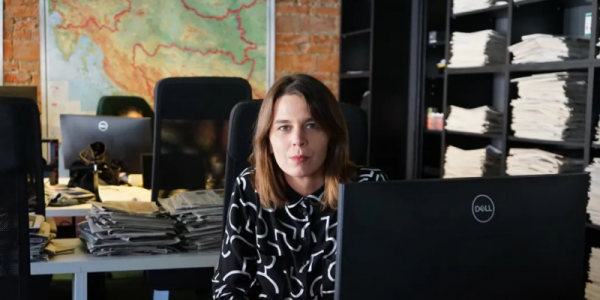Turkey has the worst record on press freedom and freedom of expression among all member states of the Council of Europe, according to a judge at the European Court of Human Rights (ECHR), which operates under the Council’s auspices. The Council of Europe has 47 members and includes all sovereign states with territory in Europe, except for Belarus, Kazakhstan, and Vatican City.
In an interview with Turkish news network NTV, Judge Işıl Karakaş stated that Turkey has faced more convictions in the area of press freedom by the ECHR than any other Council member. Moreover, Turkey leads the way in terms of press-freedom violations with over 200 this year already, she said. By comparison, France, which follows Turkey in this respect, has recorded only 10 such violations.
Judge Karakaş expressed particular concern about the length of trial and detention periods for journalists in Turkey. Her remarks come as Mustafa Balbay, former Ankara bureau chief for the Turkish daily paper Cumhuriyet, spends his 1000th day in prison and ninth month in isolated confinement.
Mr. Balbay stands accused of participating in the so-called Ergenekon plot, in which an alleged clandestine, ultra-nationalist organisation with ties to members of the military and security forces is said to have conspired to overthrow the government. Authorities claim Mr. Balbay had been selected by the group to lead a civilian political movement. His trial is currently moving forward.
Last week, IPI representatives attended the first set of hearings in the trial of IPI World Press Freedom Hero Nedim Sener, similarly accused of involvement with Ergenekon. Mr. Sener, best known for a book investigating the 2007 murder of Turkish-Armenian journalist Hrant Dink, has spent close to 275 days in prison.
Judge Karakaş also pointed to problems with Turkey’s anti-terror statute, amendments to which mandate lengthy prison sentences for those accused of publishing what the state vaguely defines as ‘terrorist propaganda.’ A report released in October by the Organisation for Security and Cooperation in Europe (OSCE) found that “media outlets reporting about sensitive issues are often regarded by the authorities as the publishing organs of illegal organizations.” The revised terror laws have been used in particular to prosecute journalists who report the statements of Kurdish separatists in Turkey’s restive southeast.
The judge further singled out the Turkish Penal Code’s infamous Article 301, which prohibits insulting ‘Turkishness,’ as being in direct violation of Article 10 of the European Convention on Human Rights, which guarantees the right to freedom of expression. The ECHR’s Court of Appeals, she noted, has ruled that Article 301 “does not suit the requirements of a democratic social order.”
IPI’s Turkish National Committee released a statement today asking for the release of Mr. Balbay, calling his imprisonment “a dark shadow over press freedom in our country.” The statement urged both the government and opposition parties in parliament to see “that all related laws (anti terror law to be on top) which give way to the detention of journalists be amended as soon as possible.”
IPI joins its Turkish National Committee in calling upon the Turkish government to honour its commitments as a member state of the Council of Europe and a party to the European Court of Human Rights. IPI Executive Director Alison Bethel McKenzie said, “We are monitoring with concern the worsening state of press freedom in Turkey and are particularly troubled by the suggestion that the Turkish government is using anti-terror legislation and conspiracy theories to silence independent media. The state needs to either produce–in a timely and transparent manner–evidence to support its allegations against Mr. Balbay and all other similarly imprisoned journalists or release them immediately. The draconian practice of placing journalists in seemingly endless periods of detention must be ended.”
According to the Freedom for Journalists Platform, an umbrella group representing local and national media organisations in Turkey, including IPI’s Turkish National Committee, the country is currently holding 64 journalists in prison, apparently making it the world’s leading jailer of journalists.


